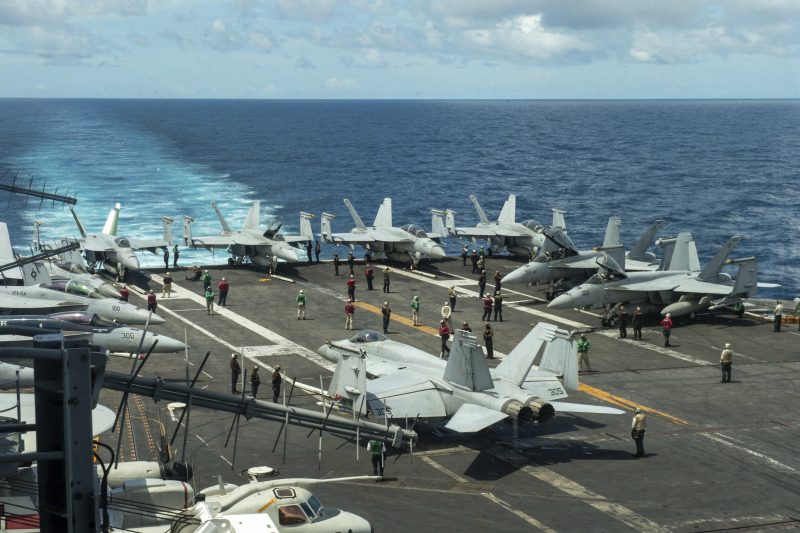The U.S. military is repositioning assets and moving additional defensive capabilities into the Middle East to defend against a potential attack on Israel by Iran, U.S. officials said.
The moves come after Ayatollah Ali Khamenei, Iran’s supreme leader, and Hezbollah leader Hasan Nasrallah vowed to retaliate after the killing this week of Hamas leader Ismail Haniyeh and a senior Hezbollah commander, Fuad Shukr.
Haniyeh was assassinated in a brazen attack at a residence in Tehran secured by the country’s vaunted Islamic Revolutionary Guard Corps. Israel has not claimed responsibility, but U.S. officials privately acknowledge it was behind the killing. Washington was not apprised of the operation beforehand and had no role in it, officials have said.
Shukr was killed in an Israeli airstrike in a Beirut suburb in retaliation for an attack last weekend in the Israeli-occupied Golan Heights that killed several children while they played on a soccer field.
The events have brought the region closer to full-blown conflict than perhaps at any point since the Gaza war began 10 months ago with a bloody cross-border attack by Hamas.
Hamas in Gaza, Hezbollah in Lebanon, the Houthis in Yemen, and a group of militias in Iraq and Syria all receive weapons and training from Iran, part of a vast anti-Israel, anti-U.S. network Tehran has supported for years.
U.S. officials have revealed little about how they are preparing for the possibility of an attack, but the White House said Thursday night that President Biden had spoken to Israeli Prime Minister Benjamin Netanyahu and affirmed his commitment to Israeli security “against all threats from Iran, including its proxy terrorist groups Hamas, Hezbollah, and the Houthis.”
“The President discussed efforts to support Israel’s defense against threats, including against ballistic missiles and drones, to include new defensive U.S. military deployments,” said a brief statement summarizing the two leaders’ call.
U.S. officials at both the Pentagon and White House declined to elaborate on what those defensive deployments entail, but the U.S. military has a broad array of aircraft, ballistic missile defenses and warships in the region.
On Friday, a U.S. official familiar with the situation, speaking on the condition of anonymity to discuss military movements, said that the aircraft carrier USS Theodore Roosevelt and at least five other warships had relocated in the past two days from the Persian Gulf to the Gulf of Oman, leaving them off Iran’s shores but moving in the direction of Israel if they sail west around Yemen toward the Red Sea.
Houthi militants in Yemen in recent months have launched numerous attacks on commercial vessels that use the vital shipping route, and on Israel itself, including a deadly drone attack that sneaked past Israeli air defenses and struck a building in Tel Aviv last month. Israel responded with airstrikes on the Yemeni port of Hodeidah.
The recent bloodshed follows a sprawling drone and missile attack by Iran on Israel in April in which the U.S. military intervened, taking down numerous drones and missiles as Israeli forces intercepted others. Iran launched that attack after an Israeli airstrike on an Iranian diplomatic compound in Syria killed two Iranian generals and other Iranian military personnel.
The rising tensions raise the prospect that the Pentagon could respond again in similar fashion.
Defense Secretary Lloyd Austin spoke with Biden after the president’s commitment to Netanyahu and will be ordering several moves in coming days, Pentagon spokeswoman Sabrina Singh said Friday. Austin said the same to Israeli Defense Minister Yoav Gallant on Friday morning, she said.
Among the options available are fighter jets aboard the Theodore Roosevelt, and the naval destroyers nearby, including the USS Daniel Inouye, USS Russell, USS Cole, USS Laboon and USS Michael Murphy. The destroyer USS John S. McCain is also in the region, remaining in the Persian Gulf as the other American warships have moved, said the U.S. official familiar with the repositioning.
Five other U.S. warships are in the eastern Mediterranean Sea and could assist Israel if called upon. They include the USS Wasp, USS Oak Hill, USS New York, USS Bulkeley and USS Roosevelt.
The Bulkeley and the Roosevelt are destroyers with offensive and defensive ballistic missile capabilities, while the other three form the Wasp Amphibious Ready Group, a three-ship team of more than 4,000 U.S. Marines and sailors that includes Marine Corps fighter jets, an infantry battalion and other combat forces from the 24th Marine Expeditionary Unit.
The Pentagon also could reposition Air Force fighter jets closer to Israel to assist. In April, two F-15 fighter squadrons deployed nearby from the United States and Britain, shooting down numerous drones. Those movements were not disclosed in advance.

